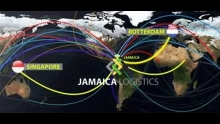Understanding Jamaica's Logistics Hub - PART 1
Understanding Jamaica's Logistics Hub - PART 1

Help Me to Understand & to Believe
I WANT to believe in the Jamaica Logistics Hub. I want to feel that this multi-pronged development initiative is going to help to realize the much-touted and highly optimistic Vision 2030 and make Jamaica the place to do business and to raise my Great Grandchildren (if I’m lucky enough to get Grandchildren in the first place).
I want to believe that the Logistics Hub will provide opportunities for my business and many, many other small and medium-sized enterprises in Jamaica.
With the foregoing in mind, I attended a recent 2-day symposium hosting by the Jamaica Chamber of Commerce in tandem with the Ministry of Industry, Investment and Commerce, Jampro Trade & Investment Jamaica and others. Note though, that I had attended about four previous sessions to do with the Logistics Hub and left all of them feeling less than convinced that those sharing information really understood what they were talking about.
The Kennedys & Johnstons
In attendance at the symposium was a family with at least six of its members present. Based on my observation, they mostly seemed pretty convinced that the Logistics Hub was a great opportunity for Jamaica, albeit not oblivious to the potential pitfalls.
I listened keenly as various members of that family spoke. They carry important positions in Jamaica’s business landscape. They have been in shipping, logistics, manufacturing, agriculture and export for many generations.
From all reports, it was through the instrumentality of one member of that family, Francis “Paco” Kennedy, President of the Jamaica Chamber of Commerce, that the symposium was hosted. Marjorie, Paco’s wife, is a Johnston and President of the Jamaica Exporter’s Association.
Pat Francis (nee Johnston) is a former Executive Director of the International Trade Centre and before that of Jampro. Listening to them and other presenters helped me to believe that the Jamaica Logistics Hub can be the game-changer that this country needs but note I said “can,” not “will
or shall.”
Knowledge Can Be Powerful
The Kennedys of Grace Kennedy manufacturing, distribution and export fame, Paco’s family, and the Johnstons of Seaboard, Jamaica Producers, Kingston Logistics Centre and more have been in business for generations. Three of the Johnston siblings, Charles, Marjorie and Pat, spoke at various points over the two days. I was impressed with their level of knowledge about progress toward the Logistics Hub and some of the related challenges.
I was also impressed with how, as business persons, the Kennedys and Johnstons are poised to create wealth from the Jamaica Logistics Hub. They already seem to have a good understanding of how to make money from the coming Hub. I am glad because it is successful businesses that will guarantee the success of the Hub — the proviso being that government removes its bureaucracy and passes clear and timely legislation to facilitate businesses.
The Government of Jamaica Must Do More
Many of us not fortunate to have generations of institutional memory and working knowledge of areas directly relating to logistics, shipping and their supporting areas are still in information-gathering mode pertaining to the Jamaica Logistics Hub.
Many of us small and medium sized business owners, the ones being heavily touted by the Government of Jamaica as standing to benefit perhaps the most from this Hub, are not doing enough to help ourselves grasp an understanding of how we can benefit and the steps we need to take to realize such benefits.
That noted, though, one cannot absolve the Government of Jamaica of its responsibility to help its citizens to understand what exactly the Jamaica Logistics Hub is all about, the timelines for completion of various components and the related policies, rules, regulations and legislations. Knowledge can be powerful. Lack of knowledge can be crippling. So, after having attended a number of sessions and then the symposium, let me share some of what I have learnt so far.
The Jamaica Logistics Hub in a Nutshell
The Logistics Hub is the centre-piece of Jamaica’s development over the foreseeable future. After listening to presenters from Panama and Canada and watching their related video presentations, my understanding is that a Logistics Hub is a specially designed location that hosts a concentration of multiple and sometimes complementary types of export businesses and that, importantly, a hub must be easily accessible via air, sea, road, rail in a manner that facilitates the smooth flow of goods and services from the hub to elsewhere, very often to a sea port since shipping is an integral aspect of logistics hubs.
Pictures were shown of countries with land scarcity where hubs were housed in high-rise, multiple-storied buildings and others where hubs were sprawling single-level warehouses and office complexes.
There is no one-size fits all. Countries build hubs and their supporting multi-modal transportation systems based on what they perceive to be best suited to that country’s needs as well as what investors will support. Based on what they see as their areas of strength/advantage countries will select specific types of businesses to focus on within a hub.
Logistics
As one presenter noted, “the logistics eco-system is a complex one.” It involves infrastructural support such as port facilities able to accommodate large container ships, airports with runways of adequate lengths to land large crafts, easily accessible and highly developed roadways/highways to facilitate rapid movement of goods to and from the hub and importantly, supporting policies/legislation to prevent bottlenecks.
A logistics hub with legal and regulatory bottlenecks, such as frequently exists in doing business in Jamaica, is a recipe for failure. Charles Johnston hammered this home.
The much-maligned but very useful Wikipedia gives the definition of logistics as “the management of the flow of resources between the point of origin and the point of consumption…. The resources managed in logistics can include physical items, such as food, materials, equipment, liquids, and staff, as well as abstract items, such as time, information… and energy. The logistics of physical items usually involves the integration of information flow, material handling, production, packaging, inventory, transportation, warehousing, and often security.”
Supply chain management is key to logistics, as, too is the concept of “value added.”
Part 2 to Come
Part 2 of this article will focus on information gleaned from the informative Professor Gordon Shirley, Chairman, President and CEO/ of the Port Authority of Jamaica, proposed Special Economic Zones (SEZs) and issues pertaining to a Financial Centre, a critical component necessary for the success of Jamaica Logistics Hub.
All business operators in Jamaica should try to understand what the Logistics Hub will mean for our businesses and how we can capitalize on or create opportunities for wealth creation.


